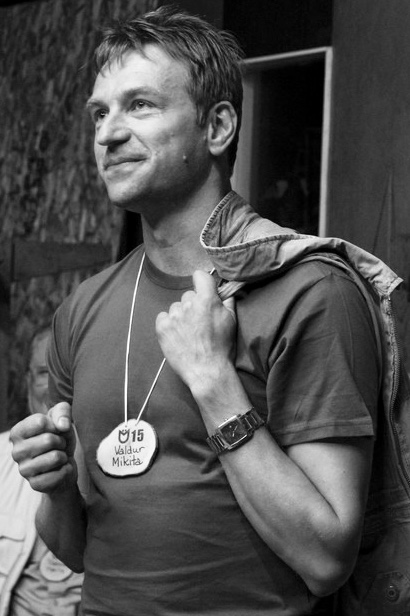
Valdur Mikita
Valdur Mikita (b. 28. I 1970), writer and semiotician, was born in Suislepa village in Viljandimaa. He completed school there in 1985 and went on to study biology at the University of Tartu as an undergraduate. Mikita switched to semiotics for his post-graduate studies, completing his master’s degree in 1994 with the thesis Normid ja loov käitumine. Harjutustik tavatu mõtlemise arendamiseks (‘Norms and Creative Behavior. An Exercise Book To Develop Unconventional Thinking’) and defending his doctoral dissertation Kreatiivsuskäsitluste võrdlus semiootikas ja psühholoogias (‘A Comparison of Creativity Treatments in Semiotics and Psychology’) in 2000. He has since worked both as a teacher and for various companies in the medical industry.
Mikita’s work often blurs the lines of genre, merging elements of fiction and semiotics. His first book, a collection of wordplay essays and poetry, Äparduse rõõm (‘The Joy of Mishap’) was published in 2000 and built on the themes of his doctoral thesis. His next book, Rännak impampluule riiki (‘A Journey to the Kingdom of Hocus-pocus Poetry’, 2001) also contained similar content. Those two books of highly experimental literature did not attract any maistream interest but created a cult following among some groups of students of humanities in Tartu and Tallinn. Mikita later published the essay Kirsiõieturundus: Visioon alternatiivsest turundusest (‘Cherry Blossom Marketing: A Vision of Alternative Marketing’, 2004), which presented ideas on the separation of culture and economy and their contrasts. This book relied on Mikita’s work experience in pharmaceutical companies.
Mikita’s next essay collection Metsik lingvistika (‘Wild Linguistics’, 2008) observed the connections of language, culture, nature, and the Estonian identity. In 2011, he published Teoreem (‘Theorem’), which contained two short stores: Jänesekapsa teoreem (‘The Shamrock Theorem’) and Nõia teoreem (‘Witch’s Theorem’). The former won the August Gailit Award in 2009. In 2013 a sequel to Metsik lingvistika was published: a collection of essays under the title Lingvistiline mets: Tsibihärblase paradigma. Teadvuse kiirendi (‘LinguisticForest: The Wagtail Paradigm. Accelorator of Consciousness’) and it was this book that gained Mikita widespread recognition, winning the Literature Endowment Annual Award and the Virumaa Literature Award in 2014 and becoming longstanding national bestseller.
Valdur Mikita’s Lindvistika ehk metsa see lingvistika (‘Birdistics or Off to the Woods with Linguistics’) was published in 2015 and is the third and final part of the trilogy of essay books on language, synesthesia, inner dialogue and relations between Estonian psychology, landscape and culture.
M. M.
Books in Estonian
Experimental poems and other texts
Äparduse rõõm: keele- ja kultuurimänge. Tartu: V. Mikita, 2000, 166 lk.
Rännak impampluule riiki. Tartu: V. Mikita, 2001, 148 lk.
Short stories
Teoreem. Vara: Hm, 2011, 127 lk. [Sisu: ’Jänesekapsa teoreem’, ’Nõia teoreem’.]
Non-fiction
Kreatiivsuskäsitluste võrdlus semiootikas ja psühholoogias. Tartu: Tartu Ülikooli Kirjastus, 2000, 146 lk. [Doktoritöö.]
Kirsiõieturundus: visioon alternatiivsest turundusest. Tartu: Fontese Kirjastus, 2004, 68 lk.
Metsik lingvistika: sosinaid kartulikummardajate külast. Tallinn: Grenader, 2008, 127 lk. [2., täiendatud trükk: Vara: Välgi metsad: 2016, 135 lk.]
Lingvistiline mets: tsibihärblase paradigma. Teadvuse kiirendi. Tallinn: Grenader, 2013, 240 lk. [2. trükk: Vara: Välgi metsad: 2016, 240 lk.]
Lindvistika, ehk, Metsa see lingvistika. Vara: Välgi metsad, 2015, 236 lk.
Tartu tähestik, ehk, Tarto maine ja taevane trükis. Tartu: Tartu Linnavalitsus, 2017, 63 lk.
Kukeseene kuulamise kunst: läänemeresoome elutunnet otsimas. Vara: Välgi metsad, 2017, 156 lk.



